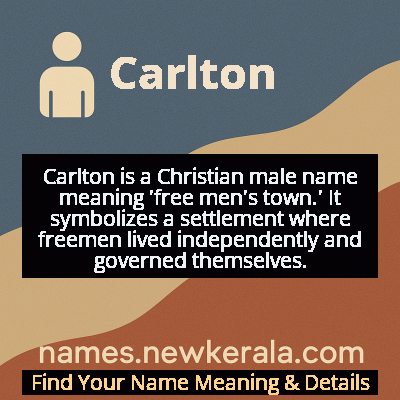Carlton Name Meaning & Details
Origin, Popularity, Numerology Analysis & Name Meaning of Carlton
Discover the origin, meaning, and cultural significance of the name CARLTON. Delve into its historical roots and explore the lasting impact it has had on communities and traditions.
Name
Carlton
Gender
Male
Origin
Christian
Lucky Number
2
Meaning of the Name - Carlton
Carlton is a Christian male name meaning 'free men's town.' It symbolizes a settlement where freemen lived independently and governed themselves.
Carlton - Complete Numerology Analysis
Your Numerology Number
Based on Pythagorean Numerology System
Ruling Planet
Moon
Positive Nature
Diplomatic, friendly, artistic, empathetic.
Negative Traits
Over-sensitive, moody, indecisive, prone to self-pity.
Lucky Colours
Green, cream, white.
Lucky Days
Monday.
Lucky Stones
Pearl, moonstone.
Harmony Numbers
1, 3, 4.
Best Suited Professions
Diplomats, mediators, caregivers, artists.
What People Like About You
Cooperative spirit, friendliness, artistic talent.
Famous People Named Carlton
Carlton Fisk
Professional Baseball Player
Hall of Fame catcher who played 24 seasons, most famous for his game-winning home run in Game 6 of the 1975 World Series
Carlton Pearson
Gospel Singer and Minister
Influential gospel music artist and pastor known for his inclusive theology and Grammy-nominated recordings
Carlton Cuse
Television Writer and Producer
Emmy Award-winning writer and producer known for creating hit shows like 'Lost' and 'Bates Motel'
Carlton Cole
Professional Footballer
English striker who played for West Ham United and Chelsea, earning 7 caps for the England national team
Name Variations & International Equivalents
Click on blue names to explore their detailed meanings. Gray names with will be available soon.
Cultural & Historical Significance
The name's usage expanded during the 19th century as surnames became fashionable as first names, particularly in English-speaking countries where it maintained its aristocratic connotations while becoming more accessible to broader populations. In American culture, Carlton became associated with both traditional values and upward mobility, often chosen by families seeking to convey establishment respectability. The character Carlton Banks from 'The Fresh Prince of Bel-Air' further cemented the name in popular culture as representing conservative, preppy values contrasted with urban modernity.
Extended Personality Analysis
Individuals named Carlton are often perceived as dignified, reliable, and possessing natural leadership qualities. The name's historical association with 'free men' tends to manifest in personalities that value independence, self-determination, and personal integrity. Carlton's typically approach life with a sense of responsibility and tradition, often displaying strong organizational skills and a methodical approach to problem-solving. They tend to be respected for their stability and dependability, making them natural leaders in both professional and social settings.
While sometimes perceived as reserved or traditional, Carlton's often possess deep convictions and a strong moral compass that guides their decisions. Their combination of practical intelligence with a sense of honor makes them particularly effective in roles requiring trustworthiness and long-term planning. The name suggests someone who builds lasting structures—whether in relationships, careers, or communities—and who values quality over flashiness. This creates a personality profile that balances conservative values with the progressive ideal of self-made success, reflecting the name's origin in communities of freemen who governed themselves.
Modern Usage & Popularity
In contemporary times, Carlton maintains a classic but somewhat uncommon status. The name peaked in popularity during the 1970s and 1980s but has since declined, giving it a distinctive quality without being overly unusual. It's often chosen by parents seeking a traditional English name with aristocratic connotations but wanting to avoid more common choices like Charles or William. The name continues to be used across English-speaking countries, particularly in the United States, United Kingdom, and Australia, where its surname-origin gives it a sophisticated, established feel. Recent years have seen a slight resurgence as vintage names come back into fashion, though it remains outside the top 500 most popular names in most English-speaking countries. Its usage patterns show it appeals particularly to educated, middle-class families who value tradition but seek distinctive naming options.
Symbolic & Spiritual Meanings
Symbolically, Carlton represents freedom, dignity, and community leadership. The 'free men's town' etymology evokes images of self-governance, independence, and collective responsibility. This makes the name emblematic of both personal autonomy and social commitment—the ideal of individuals who maintain their freedom while contributing to their community's wellbeing. In a metaphorical sense, Carlton suggests someone who builds rather than destroys, who establishes order without oppression, and who values both individual rights and communal harmony. The name carries connotations of establishment and tradition while maintaining its revolutionary roots in the concept of freemen governing themselves, creating a rich symbolic tension between stability and liberty that reflects the complex relationship between individual freedom and social responsibility in democratic societies.

